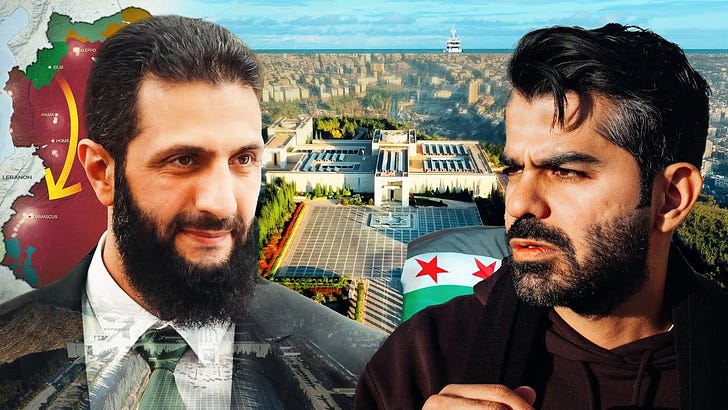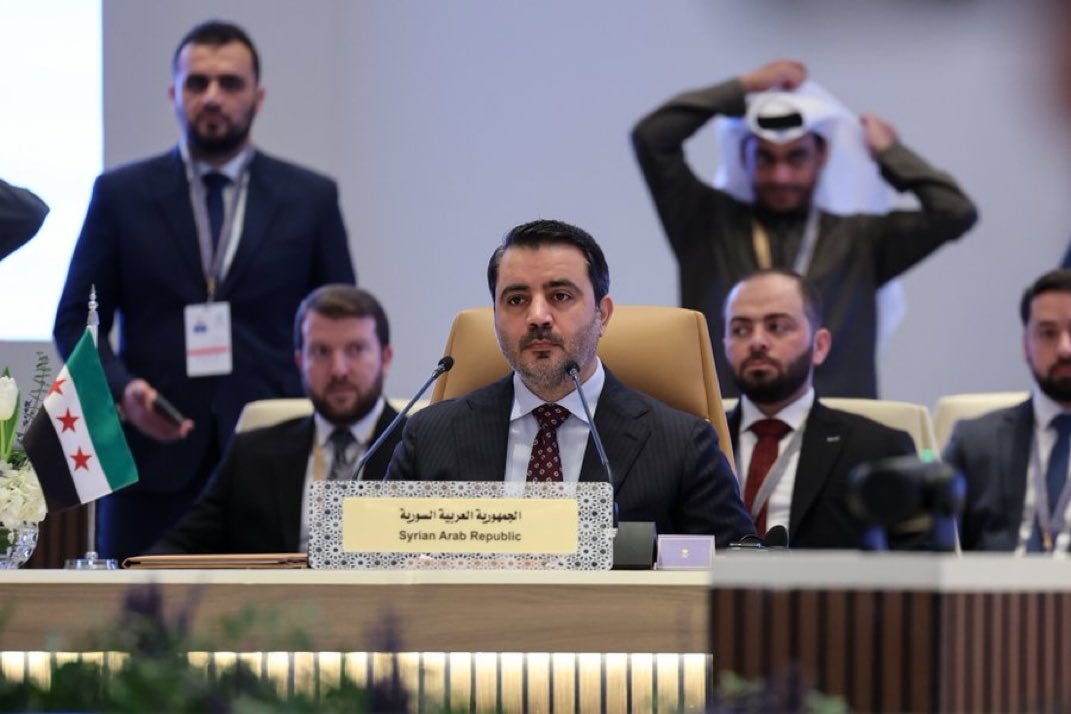Syria Weekly Report #5
Weekly Report on Syria, week beginning 06/01/25: updates on the political transition, economy, foreign policy, security, and more.
This week’s report looks at Syria’s ongoing political transition and state-building efforts, economic & infrastructural developments, foreign affairs, and ongoing security issues.
State-building & Political Transition
Ahmad Al-Shara Holds a Frank Interview
Ahmad Al-Shara, Syria’s de facto leader held an interview with the Jordanian YouTuber Joe Hattab. Al-Shara made several statements in this interview that he has repeated elsewhere, emphasising that ‘revolutionary logic’ does not build states, the importance of moving beyond vengeance and relying on courts and laws to deliver justice, and remarks on the struggles of Syrians in the diaspora, such as the lack of dignity, the weakness of the Syrian passport, the abuses they have suffered, and for the diaspora to return to their country to aid in its redevelopment.
Beyond that, this is perhaps the most ‘frank’ interview that Al-Shara has given thus far and provides an insightful look into how he is positioning himself as a statesman of ‘sovereign authority’; not just above factionalism and vengeance but also beyond the pre-and-post revolutionary distinction. To become a sovereign leader requires building trust with the various ethnic, religious, and political groups of Syria, such that the leader becomes an avatar of the authority of the state rather than the mere chief of a faction. Relying on revolutionary factionalism and distinctions would inhibit Syria’s state-building efforts and retrench old divides, and Al-Shara’s challenge now is to try and overcome these divides and build a new social and political consensus.
Ahmad Al-Shara and Usama Al-Rifai Meet in Damascus
In those efforts, outreach between the government and parts of Syria’s civil society continues apace. In our previous weekly report, we looked at the return of Syria’s Sunni scholarly class to the country and its potential social and political ramifications:
The general return of Syria’s scholars presents Ahmad Al-Shara with opportunities and challenges. Al-Shara is now Syria’s premier statesman, and if he wants to maintain that role, he has to build a broad political tent. Syria is roughly 80% Sunni (with Arabs forming 70% and the Kurds forming another 10%). Most of Syria’s Sunni community is deeply religious and the authority of the ulema class, for many, is above even the authority of the state. An alliance between Syria’s scholarly establishment and Al-Shara’s state-building efforts would unify the majority of the country under one legitimate authority, making a counter-revolution from within Syria’s Sunni majority extremely unlikely.
After some speculation, Ahmad Al-Shara and Usama Al-Rifai, Syria’s de facto Grand Mufti, finally met twice this past week. On January 8th, Al-Shara was accompanied by acting defense minister Marhaf Abu Qasra and acting foreign minister As’ad Al-Shaybani in a visit to Usama Al-Rifai at the funeral of his brother, Sariya Al-Rifai, who passed away in Istanbul after suffering a stroke several months ago. His body was brought to the Abdulkarim Al-Rifai mosque in Damascus for burial, with tens of thousands attending, including dignitaries from various religious sects.
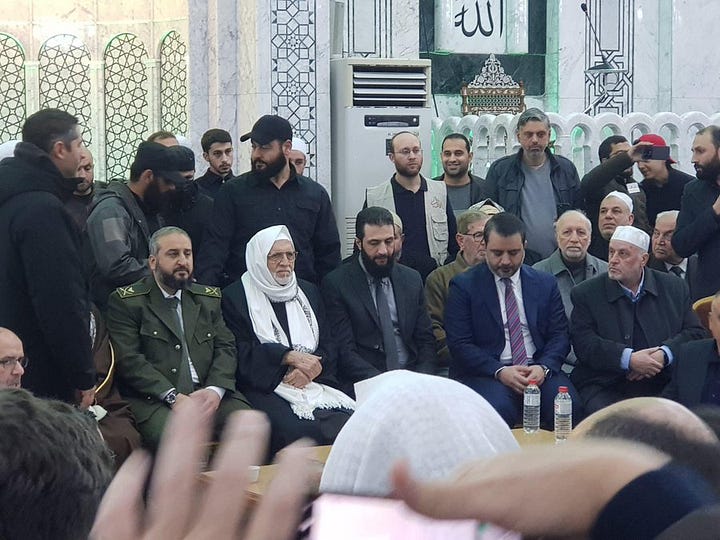
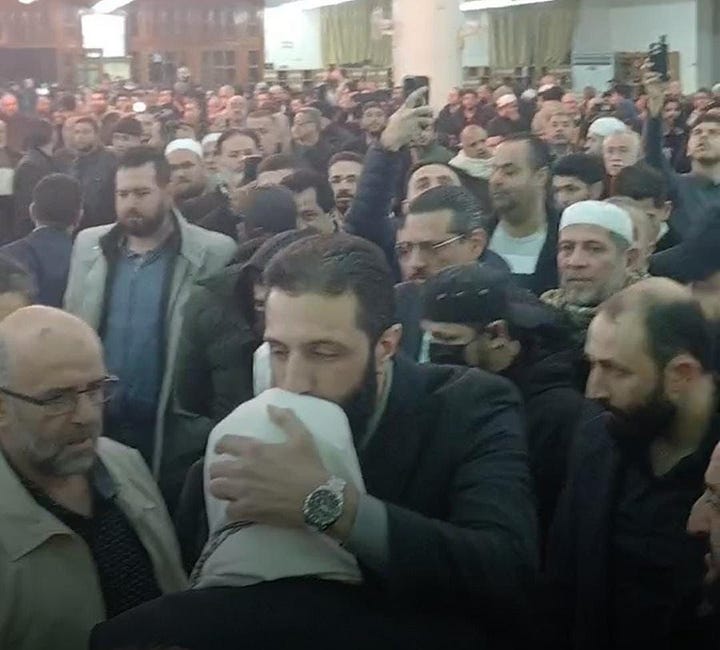
On January 10th, Al-Shara and Al-Rifai met again for a formal meeting at the ‘People’s Palace’ (formerly the ‘Presidential Palace’). Syria’s scholarship is fairly decentralised, and Al-Rifai’s weight among the Sunni scholarship and the direction he pursues will be an indicator of the general tide, and whether or not Al-Shara will be able to form the ‘big tent’ necessary to build popular support for his administration.
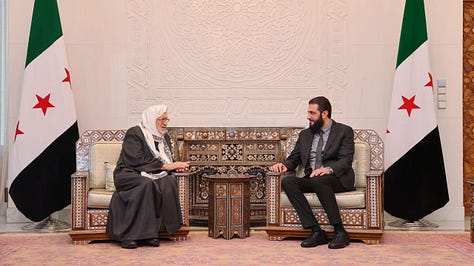
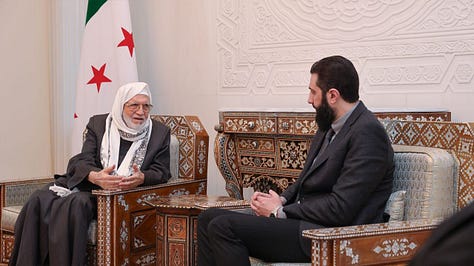
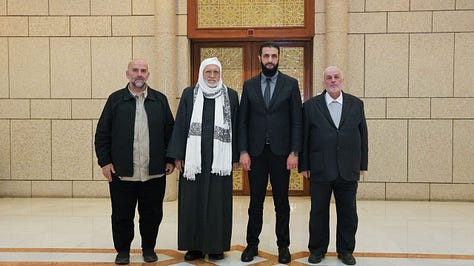
Economy & Infrastructure
The Syrian government is attempting to find the right balance in rebuilding Syria’s economy with the introduction of a unified customs tariff on January 12th. For the past thirteen years different border crossings in Syria have levied their own tariffs on imports and exports. The customs tariff at opposition-controlled border crossings with Turkiye were radically lower than customs tariffs at regime-controlled border crossings like the Nasib crossing with Jordan. The new customs tariff aims to unify all tariffs within the country by “meeting in the middle”, and this has caused tariffs in formerly regime controlled crossings in the south of Syria to drop significantly, but tariffs at opposition-controlled crossings with Turkiye in the north to radically increase.
As a result, a general strike has been declared in Idlib and Aleppo, traders are suspending operations, and there is general economic consternation in the north.
Customs tariff policy matters as it indicates the government’s direction for the Syrian economy. Mazen Alloush, Syria’s new Director of the General Authority for Land and Sea Ports, has indicated that the government’s policy is to foster the growth of local industry so that Syria does not become entirely dependent on imports. A fully open border would result in a flood of foreign goods that would crush local production. Likewise, a closed border would exacerbate Syria’s economic collapse where the 90% of the population already lives below poverty and its industry is too small to support the needs of the Syrian people, making imports necessary.
The impact this new tariff has had on northern areas will make the government reconsider changes made in the unified tariff so that essential goods (such as flour and fuel) are not affected by price hikes, although it is likely to (and should) maintain tariffs where necessary to foster industrial production.
Building a customs tariff capable of supporting the Syrian people’s demand for basic necessities while fostering local industry will be an extremely tight rope to walk. Another issue the government has to take into consideration is that Syria’s economy has largely been destroyed by the war, and a significant portion of the government’s income will come from taxes from which it will be able to pay for public sector salaries and to maintain public infrastructure. As the population can barely pay taxes, much of this revenue has come instead from border crossings.
There is some relief coming with regards to public sector salaries. Qatar is offering to cover the cost of these salaries for the year ahead, a crucial step to help cover the recent 400% salary increase. This follows the arrival of the first gas tanker from Qatar to the Syrian port of Baniyas, as well as a power ship to provide electricity. As aid ramps up from regional states and with (limited) sanctions relief from western countries, the economic outlook over the coming year should become better.
Foreign Affairs
Syria’s International Tour de Force
A mere month after the fall of the Assad regime, the new government has now had at least 96 engagements with countries, 25 with the United Nations and other international organizations, and 10 with Syrian diaspora communities, with more likely that have not been announced. Syria’s situation twelve months from now is unknowable but this is a phenomenal tour de force in foreign policy, on a hamstring budget and crew and with massive internal and external pressures. It also dismisses claims that Syria is a ‘repeat of Afghanistan’, who still faces international isolation.
Several countries sent official delegations to Damascus this past week, including Bahrain, Oman, Lebanon, and Italy. Of the four delegations, Lebanon’s visit is the most significant as Lebanon and Syria share the closest cultural and political history, and there have been significant issues with regards to terrorism, human-and-drugs’ trafficking, Syria’s large refugee population in Lebanon, and Iranian influence in both countries, all issues that Lebanon and Syria are hoping to cooperate on. As a first step, the Lebanese delegation led by Prime Minister Najib Mikati agreed to release Syrians being held in Lebanese prisons back to Syria.
In his meeting with the Italian FM Tajani, FM As’ad Al-Shaybani confirmed he will visit European capitals in the near future, but no roadmap has been provided thus far. EU states are set to meet on January 27th to discuss the EU’s agenda on sanctions on Syria and how best to ease them while maintaining options on re-instating them.
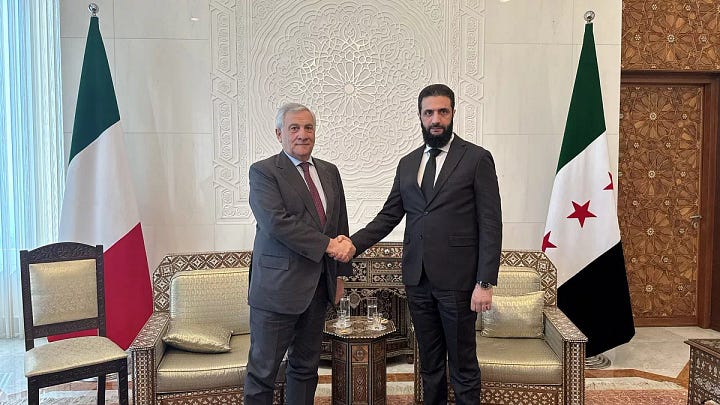
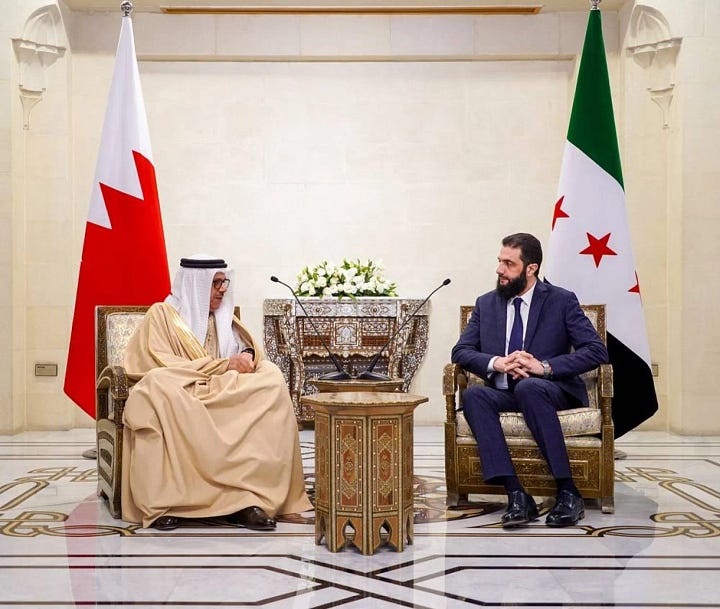
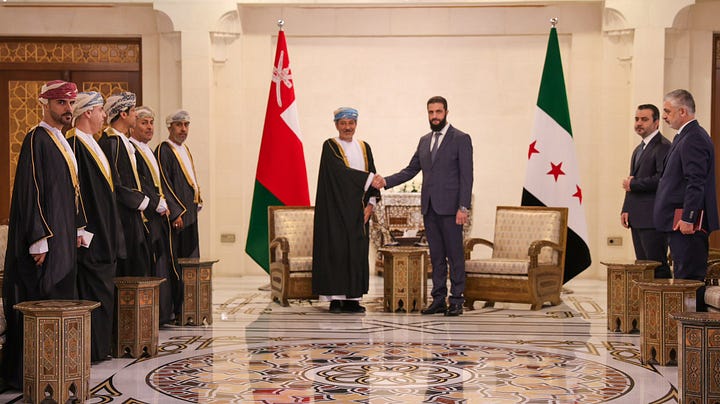
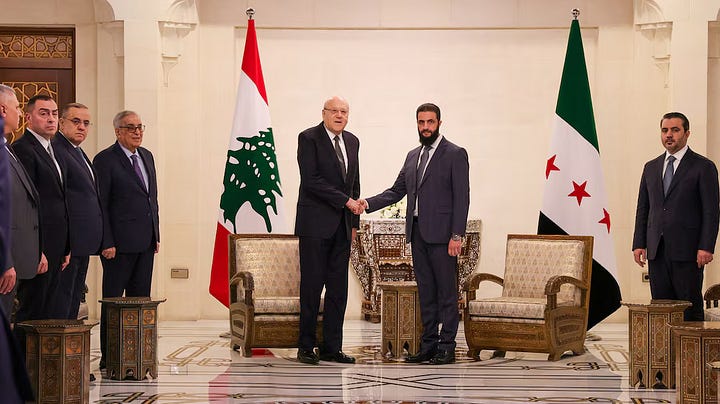
The Riyadh Summit on Syria
Saudi Arabia continues to lead on diplomatic efforts by hosting the Riyadh Summit on January 12th, with attendance from the US, the EU, the UK, the Arab League, Türkiye, and As’ad Al-Shaybani representing Syria in its first international dialogue of the post-Assad era. The main topic of discussion was sanctions’ relief on Syria, economic development, and the country’s reintroduction into the international system.
It is notable that Saudi Arabia has been the most prominent Arab country in aiding Syria in its new foreign policy, with Qatar taking a backseat and focusing instead on development and humanitarian aid. Saudi Arabia will carry more weight not just with international powers in the EU and USA, but also with other Arab countries like the UAE and Egypt who are fearful of events in Syria. Qatar’s history with Syria and the wider Arab Spring, as well as lack of ‘pull’ with regards to other Arab states like the UAE and Egypt, may have informed Qatar’s decision to allow Saudi Arabia to take the lead on Syria.
Additionally, Al-Shaybani made a remarkable speech at the summit where he dedicated the victory of the Syrian revolution to:
To those who lost their lives in the squares and whose voices calling for freedom were silenced by guns.
To those who took their last breaths under torture in Sednaya prison and others.
To those who watched their children drown in the seas as they sought asylum from the Assad regime.
To those who were subjected to racism and harassment in countries of asylum and had no choice but to remain silent and accept injustice.
To those who are accustomed to fearing the sky and the sound of planes as a result of the bombing of the criminal regime and its allies.
To all of them, we promise that this tragedy will never happen again.
Security
Rebuilding the Syrian Army
On January 6th, defense minister Marhaf Abu Qasra announced the start of ‘sessions’ aiming to unite all military factions under the umbrella of the ministry of defense. Efforts to build a united Syrian army has been advancing faster than in all other ministries. One of the key lessons from the fallout in countries like Afghanistan, Iraq, and Libya was that the presence of military factions outside the state, or remaining as factions within the state, was a key factor in long-term instability and a return to civil war. Building a new ministry of defense, a new army, ensuring no armed military groups remain outside the state, and ensuring military subordination to civilian bodies of governance will be the most determining factor for peace in Syria’s fragile transition period.
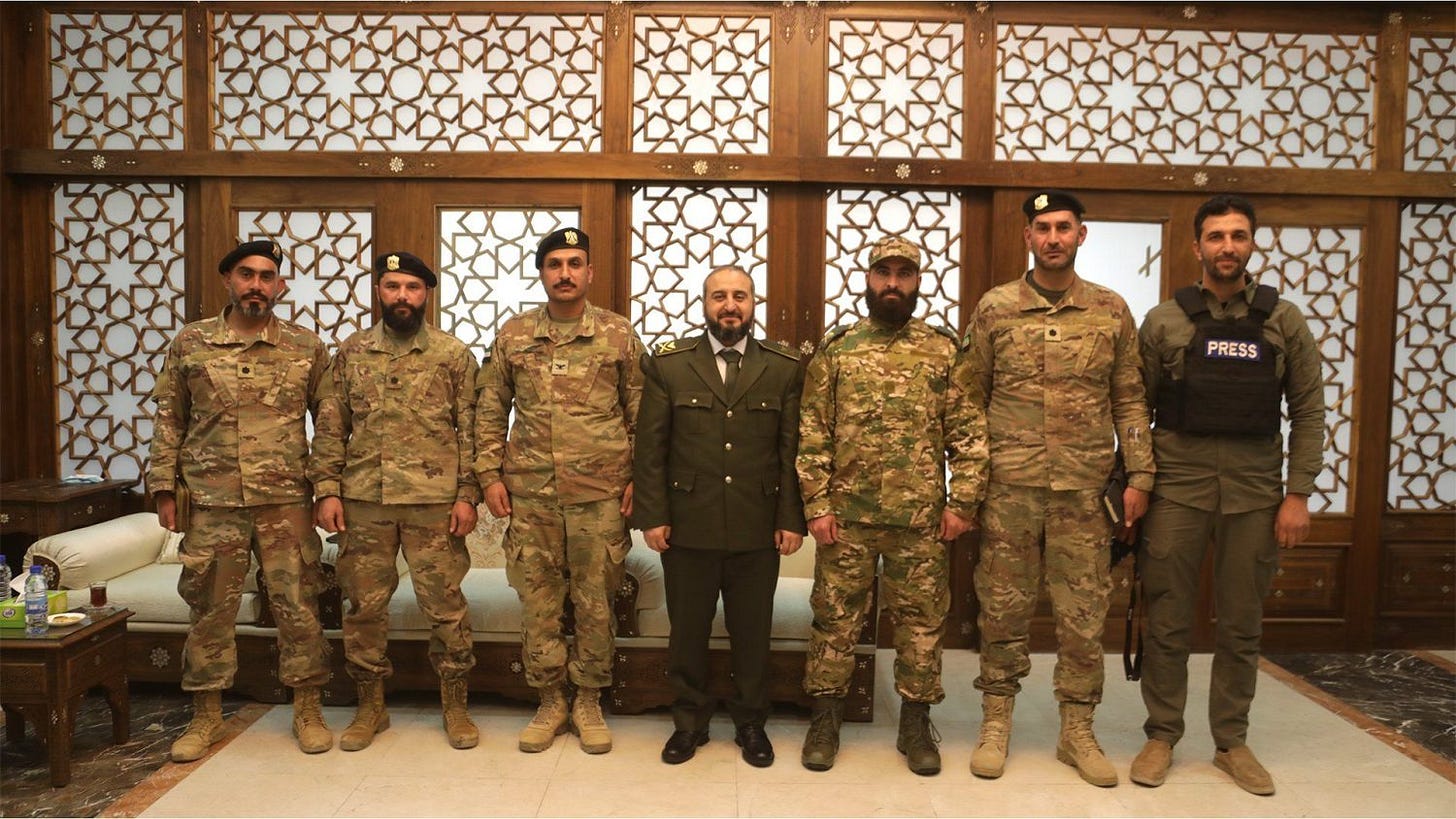
Building Internal Security
In addition to lower-order security issues and the pursuit of Assad loyalists, Syria continues to face threats from terrorist groups like ISIS and the PKK. Syria’s General Intelligence Service (“GIS”) and the interior ministry foiled at least two (publicly announced) attempted terrorist attacks this past week.
On January 10th in Aleppo, the interior ministry stopped a truck travelling from north-eastern Syria which was found loaded with explosives. There have now been at least half a dozen (confirmed) VBIEDs that have been captured or detonated across Aleppo, placed in the heart of civilian areas — a key MO of the PKK.
On January 11th in Damascus, the GIS foiled a suspected ISIS-linked cell’s plan to launch suicide bombing attacks on the Sayyida Zaynab shrine in south Damascus. While believed to be an ISIS-related cell (this attempt has not been claimed by any group), the cell’s possessions included Lebanese-Palestinian ID cards and Lebanese cash, raising questions on the possibility of other actors being involved. The objective of this attack was likely to instigate sectarian chaos not just in Syria but across the region. In 2006, an unclaimed bombing at the Al-Askari shrine in Iraq, also revered by Shi’ites, triggered widespread sectarian violence across Iraq.
In any case, the ISIS threat will be one of the GIS’ main files in Syria over the coming years. Acting intelligence minister Anas Khattab previously led HTS’ intelligence wing in Idlib under Ahmad Al-Shara, and Khattab was instrumental in the elimination of both Al-Qaeda’s and ISIS’ presence in the north-west of Syria. His task is going to try and scale this effort across Syria.
Link Dump
Inside Daraya: The Syrian town starved by Assad and freed by its people
Iran Was ‘Defeated Very Badly’ in Syria, a Top General Admits
Journey to Damascus: An Interview with Wassim Nasr
Syria: "We are facing a movement that has become deradicalized from the top"
Syria Is Alive With Possibility
What kind of conference do Syrians want?


